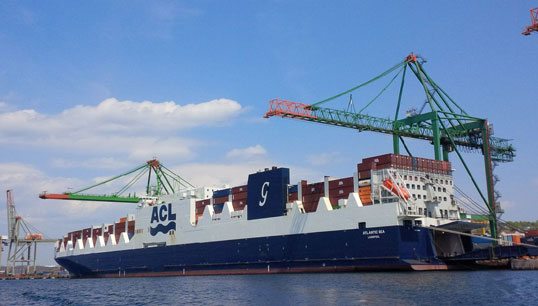
The International Transport Workers' Federation has issued a warning to Atlantic Container Line (ACL) to ensure it abides by its Maritime Labour Convention (MLC) responsibilities and ensures safe crew repatriation following an anonymous tip off from crew in Liverpool.
In June crew onboard the UK-flagged ACL Atlantic Sky, contacted ITF head office in London, inspectors in Germany, Antwerp and Liverpool, begging ITF to get them off the ship.
Several of the crew had been on board for almost 15 months, far longer than their originally contracted nine months. Some had not been on shore for over a year.
Under the MLC, a seafarer has a right to stop working and be returned home at the employer's expense once their contract has finished. The maximum a seafarer can be on board without leave is 11 months.
Crew change has become increasingly difficult during the pandemic. ITF estimates there are 300,000 seafarers trapped working aboard the world's vessels. Another 300,000 seafarers are unemployed, waiting desperately to relieve those still on ships.
The primary causes for the 'crew change crisis' are closed borders by port states, transit countries and the home countries of seafarers; as well as a lack of available flights.

'ACL has had a decent reputation in the past and the seafarers have valued their employment with them. But you must be concerned when crew contact you anonymously begging for help to get them repatriated to their homes and families whilst remaining too scared to reveal their identities. Seafarers on board ACL's ships are clearly worried about the repercussions they would face for refusing to continue to work once their contracts have finished,' Nautilus ITF inspector at Liverpool Tommy Molloy said.
'Unfortunately, we need seafarers to openly request their repatriation. That's the only way we can help get them off in ports like Liverpool and ensure they get home.'
Mr Molloy describes having to untangle a web of vessel ownership and contracting entities in order to help the mostly Filipino crew enforce their right to get off.
'The owners of the vessel are listed as being situated in USA, the registered owners are in Sweden, the parent company is in Italy, and the managers are in Monaco. I contacted a number of them on 6 July to ask if they would be replacing those crew who had exceeded contracts when the vessel arrived in Liverpool, the ship's home port,' he explained.
In an email, Mr Molloy told the company that the UK considered seafarers to be key workers and that there were no impediments preventing crew from signing off in Liverpool. The company said that there were difficulties with organising flights into and out of the Philippines.
'They told me they had tried and failed to source flights from the UK to Manila. I found and sent them details of available, albeit expensive, flights from Manchester and London and told them they had many options for replacing those seafarers.'
Thanks to the ITF's efforts, on 19 July five crew signed off the vessel in Liverpool and were relieved by Bulgarian seafarers.
The Filipino off-signers stayed in a hotel for a number of days before taking flights home to see family they had been missing for months.
However, not all the crew felt confident enough to risk the ire of their employers by asking for repatriation. The Atlantic Sky departed Liverpool for Canada with several Filipino crew who had been on board for almost 15 months, Mr Molloy said.
'The fact that these seafarers were too scared to put up their hands to stop working and request to go home is of great concern to the ITF. It also concerns us that some companies may be using the logistical difficulties of the current crisis to make excuses for not doing crew change.
'Expensive flights are no reason to delay repatriation in the hopes that they become cheaper. Employers have responsibilities under the MLC to get seafarers home after they've finished their contracts – and employers are still making money during this pandemic. Delaying further would be a slap in the face to seafarers after the loyalty and patience they have shown throughout this crisis.
'We know the impact that being trapped working aboard these vessels is having on the mental and physical health of seafarers. It's not acceptable nor sustainable to have them separated from their families – for far longer periods than they originally agreed to.
'Employers need to take every chance they have at repatriating and relieving their crew, before it's too late.'
Nautilus approached ACL for comment on this story.
Tags
More articles
Chief officer requests ITF assistance after Singapore refuses crew change
The chief officer of a Portugal registered containership whose contract has expired, contacted the International Transport Workers' Federation (ITF) asking for help, after his request for repatriation was refused by the Maritime and Port Authority of Singapore (MPA).
Maritime minister steps in to support seafarers tax provision
Maritime minister Kelly Tolhurst has stepped in to support Union calls for clarity over specific measures to support seafarers on tax provision during the pandemic.
Seafarers invited to take part in global research mapping health and wellbeing during pandemic
Seafarers working onboard international vessels are invited to take part in a joint research project on their experiences during the Covid-19 pandemic being carried out by UK, Swedish and Australian universities.
European social partners urge UK PM to use global influence in crew change crisis
Unions and shipping companies have written to UK Prime Minister Boris Johnson urging him to use the UK's position and diplomatic influence to get internationally agreed protocols implemented for the Covid-19 crew change crisis.
Over-contract seafarers stop two new ships in Australia
Over-contract seafarers stop two new ships in Australia
EU guide to safe resumption of cruise operations
The International Maritime Organization (IMO) has circulated new Covid-19 guidance for the safe resumption of cruiseship operations in the European Union.
Nautilus welcomes new maritime mental health benchmarking survey
Nautilus has welcomed a new benchmarking survey on mental health for employers being conducted in a partnership by Maritime UK, the umbrella body for the £46bn maritime sector.
Red tape continues to frustrate repatriation for thousands of seafarers, warns maritime charity
Too much red tape in many of the countries that pledged to end the crew change crisis, may be making many of the estimated 300,000 stranded seafarers reluctant to attempt to return home, according to the Liverpool Seafarers Centre (LSC).
